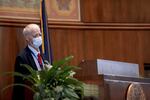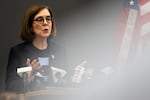
Senate President Peter Courtney, D-Salem, addresses the state Senate during a special session on Wednesday, June 24, 2020.
Pool photo by Brian Hayes / Statesman Journal
For weeks, Oregon legislative leaders have been connecting virtually with the hopes of hammering out some kind of solution to address the myriad of crises the state is facing. But with funding for critical priorities like helping sick workers and tracing the spread of the coronavirus set to dry up at the end of the month, exactly when, how and even if lawmakers might meet to extend funding is still very much in question.
“This thing changes literally hour to hour,” Senate President Peter Courtney, D-Salem, said of the ongoing negotiations.
Courtney on Tuesday confirmed legislative leaders have discussed a step that appeared to be off the table mere weeks ago: Calling lawmakers to Salem for an in-person special session, even as coronavirus rages throughout Oregon.
Such a move would be a big change from a concept that top Democrats have favored in recent weeks. Courtney, Gov. Kate Brown, and House Speaker Tina Kotek, D-Portland, have all signaled support for a “catastrophic” session that could be held without lawmakers setting foot in the Capitol.
Related: Oregon lawmakers considering first-ever ‘catastrophic’ special session next month
The vacillation reflects lawmakers’ competing priorities as a number of policies meant to help Oregonians cope with the COVID-19 pandemic near expiration on Jan. 1. Not only are protections against evictions and foreclosures set to lapse, but the new year marks the end of the state’s ability to spend federal aid money allocated by Congress earlier this year.
That funding has gone to pay for a range of new programs lawmakers created in order to combat the pandemic and its devastating economic consequences, such as a fund that helps undocumented immigrants pay their bills and a program that pays workers $120 a day if they need to quarantine.
Combined with the money that will likely be required to distribute a vaccine for COVID-19 and funding for wildfire recovery and prevention, officials say Oregon could be facing a funding gap of up to $600 million in the coming months.
Hoping to bolster state’s emergency fund
The threat of such a “funding cliff” has prompted serious talks of a one-day legislative session, with a single bill that would send a flood of cash into the state’s emergency fund. The Legislature’s joint Emergency Board, which has spending authority when lawmakers are not in session, could use the money as it saw fit.
It appeared earlier this week that lawmakers were on the verge of striking a deal for such a session, according to people close to the process.
“There is somewhat agreement on one issue: To put more money in the e-board to respond to tragedies and emergencies,” Courtney said.
But some lawmakers pushed back, saying they want far more out of a special session. House Democrats have circulated an ambitious slate of potential bills, including a proposal to extend the state’s ban on residential evictions by six months, and setting up a fund to pay back landlords for a portion of lost rent — an idea that has struggled to gain widespread Democratic support.
Lawmakers have also proposed extending protections from residential foreclosures, closing tax breaks included in the federal CARES Act passed earlier this year, allowing bars and restaurants to serve to-go cocktails, and protecting schools from some COVID-related lawsuits.
How much political support there is to pass some or all of those proposals was unclear Wednesday, but disagreement over which policies deserve priority has complicated talks around a special session. The matter is likely made more difficult by a leadership battle in the House. Rep. Janelle Bynum, D-Clackamas is seeking to supplant Kotek, the longtime speaker, a move which has caused some tension among Democrats.
As COVID-19 cases surge, in-person session would cause concern
Any special session held in person, however brief, would likely spur concerns. The state continues to see record spread of COVID-19, and most counties in the state have severe restrictions on gatherings and commerce. In a November meeting with reporters, Courtney was adamant that Gov. Kate Brown should not call an in-person special session.
“I do not want and I haven’t wanted a special session in the building for the rest of the year,” Courtney said at the time. Later he added that if Brown insisted on calling a session, “I would come in because I’m a soldier. I obey orders.”

Gov. Kate Brown speaks at a press conference on March 16. The Democratic governor has been working with legislative leaders to find consensus on a special session this month.
Kaylee Domzalski / OPB
Rather than a typical special legislative session in the Capitol, Brown has appeared more likely in recent weeks to tap a never-used provision in the state Constitution that allows her to declare a “catastrophic” session.
“The likelihood of a catastrophic session is great,” the governor said last week in a meeting with reporters. “I am working with legislative leadership on that package.”
Under such a move, lawmakers would be allowed to meet and vote on bills remotely, rather than risking exposure to the coronavirus. But the idea has raised concerns among some who fear that Democrats could abuse the comparatively lax rules allowed under a remote session.
“Apparently there is significant resistance to the catastrophic special session,” said state Sen. Michael Dembrow, D-Portland, who said lawmakers had been inundated over the weekend with calls not to hold a remote session. “If our only alternative is a one-day, in-person special session then I think the idea of putting money into the e-board makes sense. I don’t like the idea of us meeting in person... but if we do, it has got to be in and out.”
Gov. Brown reluctant to issue extension on existing evictions ban
Dembrow and other lawmakers have noted that Gov. Brown could unilaterally extend an existing ban on evictions that’s scheduled to expire on Dec. 31. That would prevent a wave of displacement for tenants who’ve been unable to pay rent due to the pandemic while allowing lawmakers to consider options for compensating landlords who have had to forego rental income.
But the governor has seemed reluctant to the idea of using her executive authority.
“She doesn’t want to extend the ban on evictions,” Courtney said. “She can tell you why.”
Oregon lawmakers have experience meeting under the pall of COVID-19. The Legislature has held two special sessions in the Capitol already this year. Those sessions included unprecedented rules that lawmakers should wear face masks when on the floor, and saw House members filing into the chamber in shifts to vote on bills.
On Tuesday, Courtney admitted the negotiations over a third session have been, at times, frustrating.
“These are times like we have never seen,” Courtney said. “These are times for making big plays and this is the time for individuals to rise above … and make it happen. You caught me at a bad time.”